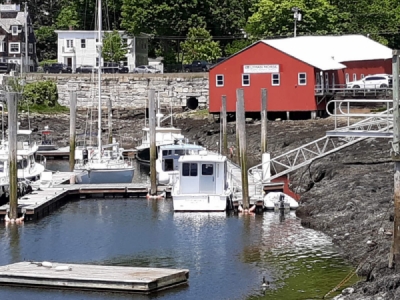
Posted on July 9, 2019
Camden — A proposal by Lyman Morse to send dredge spoils to the Mid Coast Solid Waste transfer station to assist with sealing off the landfill, in exchange for a discounted dumping fee, will not move forward.
Joshua Moore, of Lyman Morse, was invited to speak to the MCSW Board at its regular monthly meeting June 26. At the meeting, several board members characterized approval as unlikely because of the large amount of material and the request for a deep discount on fees. Moore said July 2 that the proposal “looks like it may not be feasible,” and has communicated that to Camden Town Manager Audra Caler-Bell.
He said the company is “still looking at all of our options.” It is “remarkably clean material” that can be used in a variety of situations for fill material, he said. Testing of the material to be dredged was overseen by the Maine Department of Environmental Protection. The product is categorized as beneficial use material.
The dredging project will take place this winter, to allow for a small extension to the dock system at the head of the harbor near the red shed, Moore said. Lyman Morse has received all the required approvals from the DEP, Army Corps of Engineers, and other agencies, he said. It also has approval from the Camden Planning Board for an amended site plan, required for the dock extension.
Prior dredging for the dock extension was done in the same area in 2006-07 by previous owner Wayfarer Marine, but part of the dock was never built, according to Moore. Since that time, silt that flows down a stream from the Camden Hills and through a culvert under Atlantic Avenue has collected in the dock area at the head of the harbor.
Moore provided details on the dredging to the MCSW Board June 26. At the head of the harbor, dredging will attempt to go to a depth of 8 feet, and will dig up between 1,700 and 1,750 cubic yards of fill. A limitation on the depth of material removed would occur if ledge were found, he explained.
In front of the company’s docks on the harbor, a smaller dredging area, or trench, will also remove material to a depth of 8 feet. This will amount to about 552 cubic yards of dredged material. The purpose of the work is to accommodate the draft of larger sailboats, which is typically 15 feet, Moore said.
The Lyman Morse proposal was intended to be mutually beneficial to the transfer station and the marina, according to Moore, with the company supplying material that could seep into gaps underground in the landfill where fires can occur, while receiving a discount on fees to dump the material. Moore said the standard fee quoted to him by Caler-Bell would not be cost-effective for the company.
The material to be dredged was tested and analyzed in November, and the test came back “remarkably clean, there are no contaminants in it,” Moore said. The testing is regulated by the DEP, for a category called “beneficial use.” Moore explained that dredge spoils are a different product than clean fill, and that it has to be covered with something else.
Caler-Bell said she discussed the proposal with Dave St. Laurent, who runs Rockland’s transfer station and landfill, which accepted dredge spoils eight years ago. According to St. Laurent, the de-watered material has the consistency of applesauce, she said. She commented that Lyman Morse’s offer comes at a time when the MCSW board “is grappling with policy questions” including whether to fill up the landfill slowly or fast, setting goals for the type of material to accept, and whether or not to discount fees for certain materials.
MCSW Board member Bob Falciani representing Camden, remarked that until all of the layers of the areas to be dredged are tested, it is not known whether the material would fill underground gaps, or would sit on top of the landfill. Board member Alison McKellar, also representing Camden, said the idea of the dredge material filtering through the landfill was good in theory, but she questioned whether the filtering would be stopped by materials inside the landfill.
McKellar and MCSW Board Chairman Owen Casas questioned whether the discount Lyman Morse proposed could be justified to taxpayers.
McKellar said the amount of material is about a third of what the facility takes in annually. “It would be a tough sell to tell people we’re using that much space in the landfill for such a small amount of revenue,” she said, and suggested running the idea by the facility’s “landfill engineers or our future manager.”
Beth Kwiatkowski, interim manager of the transfer station, spoke about the number of loads and the schedule for transporting the material, which is classified as a special waste, additional fees because of the type of material, whether the material would have to be stored elsewhere on the transfer station site and then moved to the landfill, and whether MCSW possessed the equipment needed for the work.
Moore said about 200 cubic yards of material is de-watered on a barge per day.
Casas said he did not think the transfer station could waive fees and provide the discount proposed by Lyman Morse, and asked the company to come up with its best offer. That would be something the board could review at its next meeting in a month, he said. He also asked Moore if the company has other options.
Moore said Lyman Morse is pursuing multiple options for the dredged material, which “include using it on our own properties, as well as other potential sites in Camden and the immediate vicinity. He told MSCW board members June 26, “if the transfer station can use it, great, but we’re not trying to push it.”
Source: knox.villagesoup.com





